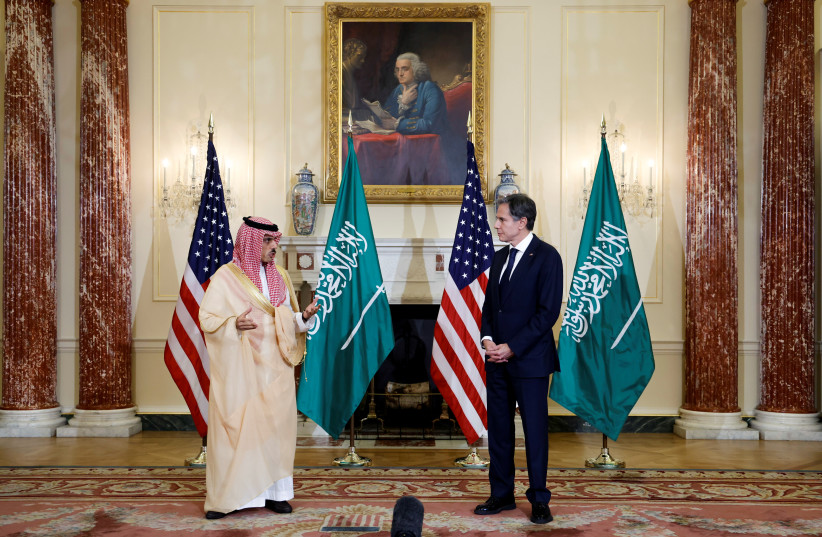US Secretary of State Antony Blinken spoke on Monday with Saudi Foreign Minister Prince Faisal bin Farhan Al Saud and “discussed the challenge posed by Iran’s nuclear program and its destabilizing behavior in the region, and opportunities for greater cooperation on regional issues,” the State Department said in a follow-up statement.
According to a readout of the call, Blinken thanked his peer for efforts to strengthen and extend the truce in Yemen, and the two “discussed efforts to avert the economic, environmental and humanitarian threats posed by the Safer oil tanker in the Red Sea region. The secretary underscored the importance of international support for Ukraine as it defends its sovereignty and territorial integrity, and emphasized the need for a global response to the food security crisis resulting from [Russian] President [Vladimir] Putin’s brutal war.”
The call came on the heels of US President Joe Biden’s decision to retain Iran’s Islamic Revolutionary Guard Corp on the US Foreign Terrorist Organizations list, a move that has been a stumbling block to reviving the 2015 Iranian nuclear deal.
It also comes as Biden is expected to visit the region in the upcoming weeks. No date has been set for the visit, but it is widely believed that it will take place at the end of June and could possibly include a stop in Saudi Arabia.
Biden prepares for Middle East visit
Biden has yet to visit the region since taking office in January 2021.

Foreign Minister Yair Lapid told Army Radio on Monday that there was talk about Biden possibly arriving at the end of the month, but that “the last details had to be finalized.”
Speculation has been high that Biden’s plans for an Israel-Saudi trip are connected to a potential announcement about the advancement of Israel-Saudi ties.
“It is not like we will wake up one morning and there will be a surprise” announcement about Israeli-Saudi peace, Lapid told Army Radio. “There will be a long, slow and cautious process.”
Lapid acknowledged that Israel was working with the US, Egypt and other Gulf partners on normalizing relations with the Saudis.
It is in Israel’s interest to normalize these ties, Lapid said, and that while it is possible it might not happen under the current government or even the next, perhaps it will three foreign ministers from now.
To push matters along, the US is eying a possible deal involving the islands of Tiran and Sanafir on the edge of the Gulf of Aqaba – otherwise known as the Straits of Tiran – that could lower oil prices in the US and push forward the normalization of ties between Israel and Saudi Arabia.
A story about such a deal was first reported last week by Walla News.
Egypt, which has had possession of the islands, has already agreed to transfer them to Saudi Arabia, but both Israel and the United States need to sign off on the agreement.
Israel captured the islands from Egypt during the Six Day War, and they were part of the territory ceded to Egypt in the 1979 peace deal in exchange for an international peacekeeping force backed by the US.
US-Saudi relations
Top US envoys Amos Hochstein and Brett McGurk visited Saudi Arabia last week, a week after Deputy Minister of Defense Prince Khalid bin Salman visited Washington, where he met with US National Security Advisor Jake Sullivan, McGurk and US Secretary of Defense Lloyd Austin.
Defense Minister Benny Gantz was in Washington at the same time, where he also met with Austin.
Blinken in the last few days has spoken with Lapid, the Saudis and the Egyptian foreign ministers.
Biden has until now avoided meeting with Saudi Crown Prince Muhammad Bin Salman. Shortly after taking office, the Biden administration released a US intelligence report that found Bin Salman was responsible for approving an operation in which Washington Post columnist Jamal Khashoggi was murdered and his body dismembered.
However, in recent months, as gas prices reached an all-time high, the administration reached out to the kingdom, asking it to boost oil production. The Saudis, according to media reports, refused.
